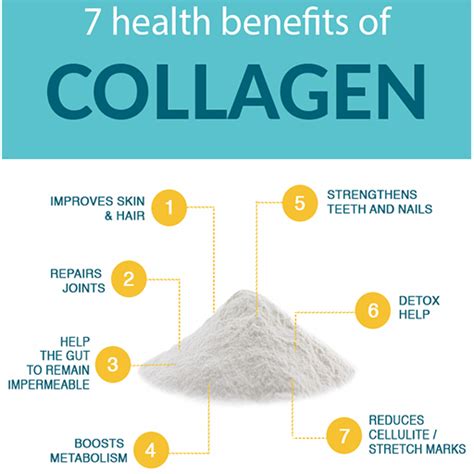
Introduction
Collagen is the most abundant protein in the human body, accounting for about 25-35% of the total protein content. It is a structural protein that provides strength, flexibility, and elasticity to various tissues, including skin, bones, cartilage, and tendons. In the skin, collagen plays a crucial role in maintaining its youthful appearance, firmness, and elasticity.
Collagen and Skin Health
As we age, the production of collagen in the body gradually declines. This decline contributes to the visible signs of aging on the skin, such as wrinkles, fine lines, and sagging. In addition, exposure to environmental factors such as ultraviolet (UV) radiation, pollution, and smoking can further damage collagen and accelerate the aging process.
The Benefits of Collagen for Skin Health
Numerous studies have demonstrated the benefits of collagen for skin health. Here are some of the key benefits:
- Improves skin elasticity: Collagen provides the skin with its elasticity, which gives it a youthful and plump appearance.
- Reduces wrinkles and fine lines: Collagen helps to fill in wrinkles and fine lines, making them less visible.
- Promotes skin hydration: Collagen helps to retain moisture in the skin, keeping it hydrated and supple.
- Protects against UV damage: Collagen can help to protect the skin from the damaging effects of UV radiation, reducing the risk of sunburn and skin cancer.
- Reduces inflammation: Collagen has anti-inflammatory properties that can help to reduce redness and irritation on the skin.
- Promotes wound healing: Collagen is essential for wound healing, as it helps to form new skin tissue and repair damaged tissue.
How to Increase Collagen Production
There are several ways to increase collagen production in the body, including:
- Consume foods rich in collagen: Foods such as bone broth, chicken skin, and fish contain high levels of collagen.
- Take collagen supplements: Collagen supplements are available in various forms, including capsules, powders, and liquids.
- Use topical collagen products: Topical collagen products, such as creams, serums, and masks, can help to deliver collagen directly to the skin.
- Get regular exercise: Exercise can help to stimulate collagen production.
- Protect your skin from UV damage: Limit your exposure to UV radiation by wearing sunscreen and protective clothing.
- Quit smoking: Smoking damages collagen and accelerates the aging process.
Collagen VS Hyaluronic Acid
Hyaluronic acid is another important molecule for skin health. It is a glycosaminoglycan that helps to retain moisture in the skin and gives it a plump and youthful appearance. While collagen and hyaluronic acid work together to support skin health, they have different functions. Collagen provides strength and structure to the skin, while hyaluronic acid provides hydration and plumpness.
Case Detail: Collagen and Wound Healing
A study published in the journal “Wound Repair and Regeneration” found that collagen supplements can help to accelerate wound healing. The study participants who took collagen supplements experienced a significant reduction in wound size and improved wound healing compared to the placebo group.
Conclusion
Collagen is essential for maintaining the youthful appearance and health of the skin. As we age, collagen production declines, leading to visible signs of aging. By understanding the benefits of collagen and implementing strategies to increase collagen production, we can help to preserve the health and beauty of our skin for years to come.
Questions for Further Discussion
- What are the other foods that are rich in collagen?
- What are the potential side effects of collagen supplements?
- How can we prevent the breakdown of collagen in the skin?
- Are there any alternative natural remedies for increasing collagen production?
- What is the difference between collagen and elastin?





















